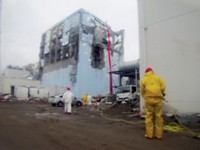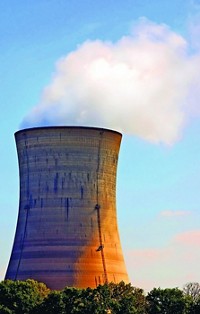Advertisement
Grab your lab coat. Let's get started
Welcome!
Welcome!
Create an account below to get 6 C&EN articles per month, receive newsletters and more - all free.
It seems this is your first time logging in online. Please enter the following information to continue.
As an ACS member you automatically get access to this site. All we need is few more details to create your reading experience.
Not you? Sign in with a different account.
Not you? Sign in with a different account.
ERROR 1
ERROR 1
ERROR 2
ERROR 2
ERROR 2
ERROR 2
ERROR 2
Password and Confirm password must match.
If you have an ACS member number, please enter it here so we can link this account to your membership. (optional)
ERROR 2
ACS values your privacy. By submitting your information, you are gaining access to C&EN and subscribing to our weekly newsletter. We use the information you provide to make your reading experience better, and we will never sell your data to third party members.
Safety
NAS Report Urges Nuclear Industry To Prepare For Natural Hazards
Safety: Learn from Fukushima Daiichi, the panel adjures the nuclear industry and NRC
by Andrea Widener
July 28, 2014
| A version of this story appeared in
Volume 92, Issue 30
The nuclear industry and regulators need to seek information about and prepare for rare hazards such as the earthquake and tsunami that devastated Japan’s Fukushima Daiichi nuclear power plant in 2011, the National Academy of Sciences (NAS) says in a study released last week.
Rare happenings, both natural and human-caused, have brought about many of the world’s nuclear power plant accidents, including the Three Mile Island accident in Pennsylanvia, the Chernobyl disaster in Ukraine, and, most recently, the Fukushima Daiichi catastrophe, NAS says in the report.
“There is some new evidence that some of these events are not as rare as perhaps we thought,” says B. John Garrick, a nuclear consultant and member of the committee that wrote the report.
The nuclear industry and the Nuclear Regulatory Commission should expand their risk analyses to include impacts from major disasters that could damage critical safety features and affect several nuclear plants at once, the report says. It recommends that U.S. nuclear plant owners train plant employees to deal with these events as they unfold, rather than just training them to respond to specific known hazards.
Many of the Fukushima Daiichi problems were created by failure of the plant’s power supply, which prevented employees and emergency responders from monitoring the state of the plant’s reactors. The report recommends improving backup power systems and designing ways to monitor reactor venting, heat buildup, and other changes during emergency situations. Maintaining communication is also critical, it says.




Join the conversation
Contact the reporter
Submit a Letter to the Editor for publication
Engage with us on Twitter